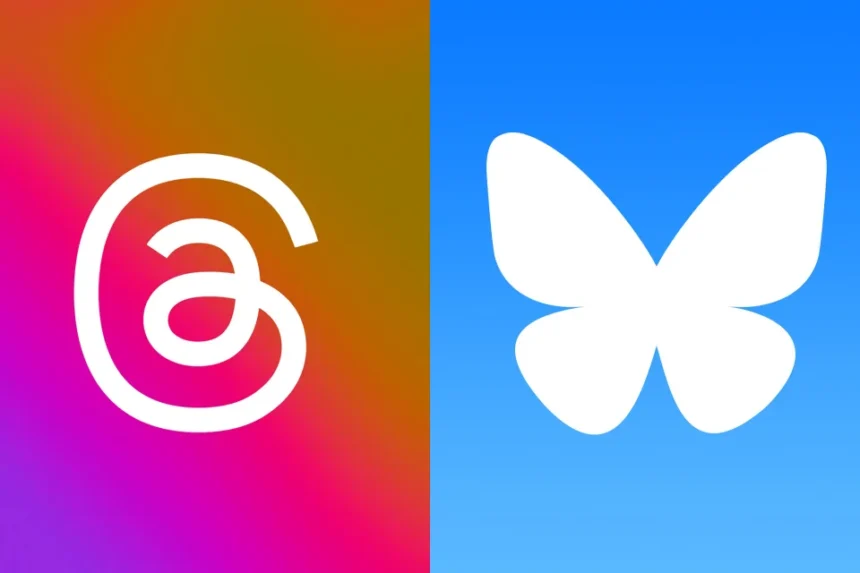The two text-based platforms share some of the same goals, but almost none of the same tactics for getting there.
The collapse of Twitter’s dominance in the text-based social media space has opened the door for a new wave of contenders. Among them, Threads and Bluesky have emerged as the most viable alternatives, but they’re not just filling the void left by Twitter’s decline. Instead, they offer fundamentally different visions for the future of online conversation. Let’s dive into how these platforms—with their distinct philosophies and approaches—are shaping what comes next.
Threads: Meta’s Controlled Playground
Threads, a product of Meta and its powerhouse leader Mark Zuckerberg, is deeply intertwined with the company’s broader social media ecosystem. Since its launch, Threads has touted its aim to foster “public conversation,” but Meta’s history of heavy-handed curation and algorithmic meddling often casts doubt on this claim.
Moderation Overreach
Meta’s approach to content moderation has been a double-edged sword. While some controls aim to create a safer online environment, others have led to head-scratching restrictions and outright censorship. For example, during an election year, Meta throttled what it labeled “political” content, requiring users to opt in to see posts about elections or social issues. The company’s efforts to limit “potentially sensitive” content have sometimes bordered on the absurd. At one point, users were unable to search Threads for topics related to COVID-19 or vaccines. Even more perplexing, innocuous terms like “saltines” and “cracker” triggered penalties for some accounts.
In a high-profile embarrassment, searches for posts about Austin Tice, a journalist missing in Syria, were blocked because Meta’s systems flagged the content as potentially related to drug sales. While Meta has since apologized and lifted these restrictions, the frequent missteps illustrate the risks of centralized, algorithm-driven moderation.
Algorithmic Chaos
Threads defaults to an algorithmic “For You” feed that serves up a mix of content from followed accounts and random posts—a combination that many users find disjointed and, at times, frustrating. Though Meta has announced plans to test allowing users to set their “Following” feed as the default, it remains unclear when or if this will roll out broadly. Even creators being paid to post on Threads have admitted they struggle to fully grasp the platform’s identity and functionality.
The Road Ahead
While Threads has so far remained ad-free, that’s likely to change soon. Meta’s advertising machine, which drives billions in revenue, is already looming over the platform. Reports suggest Threads may introduce ads as early as January 2025. Despite Zuckerberg’s assurances that Threads isn’t being rushed into becoming a “large business,” its eventual commercialization seems inevitable.
Bluesky: Decentralization as a Philosophy
In stark contrast to Threads, Bluesky’s vision for social media is built on decentralization and user empowerment. Born from a project initially funded by Twitter, Bluesky operates as an independent entity under the leadership of CEO Jay Graber. The platform emphasizes user choice and democratic governance over top-down control.
A New Approach to Moderation
Rather than imposing rigid rules, Bluesky employs a model of “baseline moderation” and allows users to customize their experience. Users can choose moderation settings that align with their preferences or even create their own moderation services. According to Graber, moderation is akin to governance: “We don’t think one person or one company should unilaterally decide the norms of a public conversation ecosystem.”
This user-first philosophy has resonated with many who are tired of centralized platforms dictating what they can and cannot see. While Bluesky isn’t immune to moderation controversies, its decentralized approach offers a refreshing alternative to the walled gardens of Threads and X.
Prioritizing News and Conversation
One of Bluesky’s standout features is its commitment to fostering link sharing and promoting news content. At a time when X has penalized posts with external links and Threads’ executives openly admit they don’t want to “encourage” hard news, Bluesky has embraced its role as a platform for meaningful dialogue. Publishers have reported receiving significantly more traffic from Bluesky compared to Threads and X, highlighting the platform’s unique value proposition.
Reverse Chronological Feeds and Customization
Bluesky defaults to a reverse chronological feed, giving users a clear and unfiltered view of posts from accounts they follow. Additionally, the platform allows users to subscribe to custom feeds based on specific topics. Whether it’s a “cat pics” feed or a “trending news” feed, the flexibility offers a level of personalization that stands out in today’s algorithm-driven landscape.
The Monetization Question
Like Threads, Bluesky has remained ad-free, but it’s exploring alternative revenue models. The platform has already started selling custom domains and plans to introduce a subscription service with premium features. While Graber hasn’t ruled out advertising entirely, she’s made it clear that Bluesky will prioritize user experience over aggressive monetization. “We don’t want to enshittify the platform for the sake of ads,” she said.
Meta’s Goliath vs. Bluesky’s David
Threads’ association with Meta gives it a massive advantage in terms of scale and resources. With a user base more than 10 times the size of Bluesky’s, Threads has the kind of reach and financial backing that few startups can match. But this corporate might is also its greatest vulnerability. Many users are wary of Meta’s track record on privacy, data exploitation, and advertising overreach.
Bluesky, by contrast, is an underdog—and its independence is a key selling point. The platform’s open-source, decentralized ethos has attracted a passionate community of users and developers. Third-party apps and tools have flourished on Bluesky, fostering innovation in ways that centralized platforms rarely allow.
Looking Ahead
As we head into 2025, the battle between Threads and Bluesky will likely intensify. Threads will continue leveraging Meta’s vast infrastructure and resources to scale its user base, while Bluesky will focus on refining its decentralized model and growing its community. Whether Bluesky’s democratic vision can withstand Meta’s “copy-or-kill” tactics remains to be seen.
Ultimately, the competition between these two platforms isn’t just about user numbers or ad dollars. It’s about fundamentally different ideas of what social media should be. Threads represents the centralized, algorithm-driven future we’ve come to know, while Bluesky offers a glimpse of a more open, user-controlled alternative. As Jay Graber put it, “We set out to change the way social media works from the bottom up.” Whether that change will stick is a question only time can answer.










